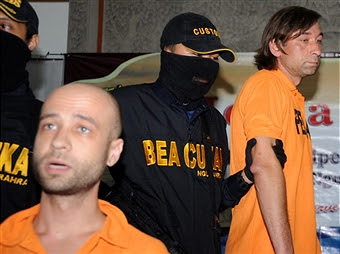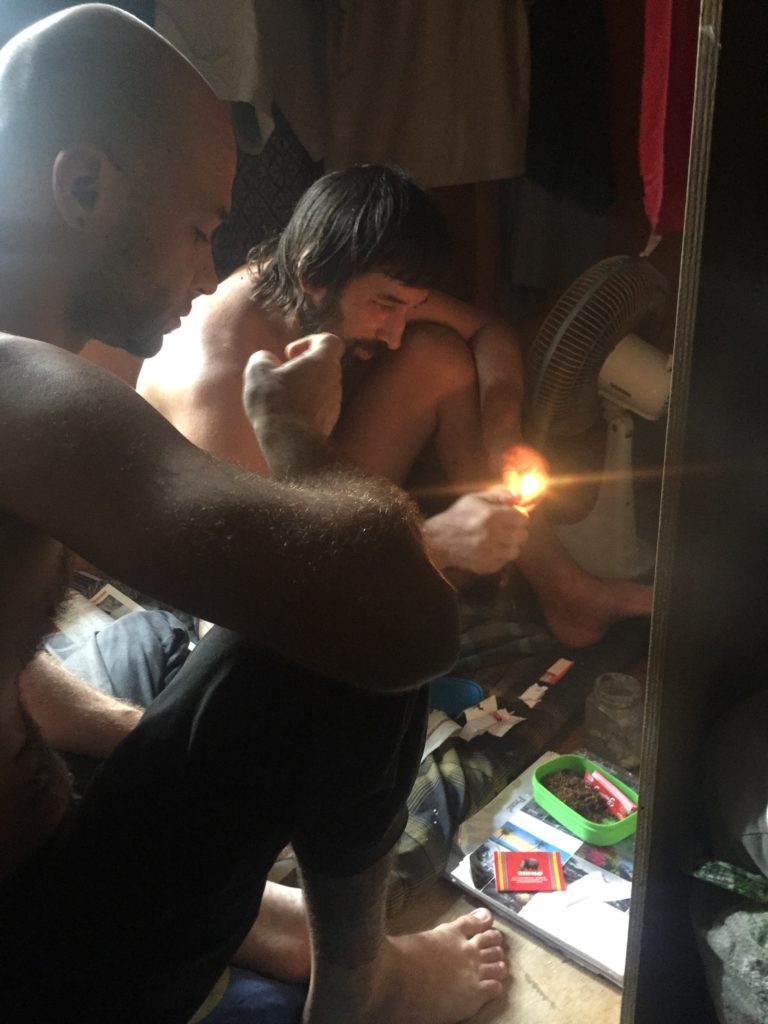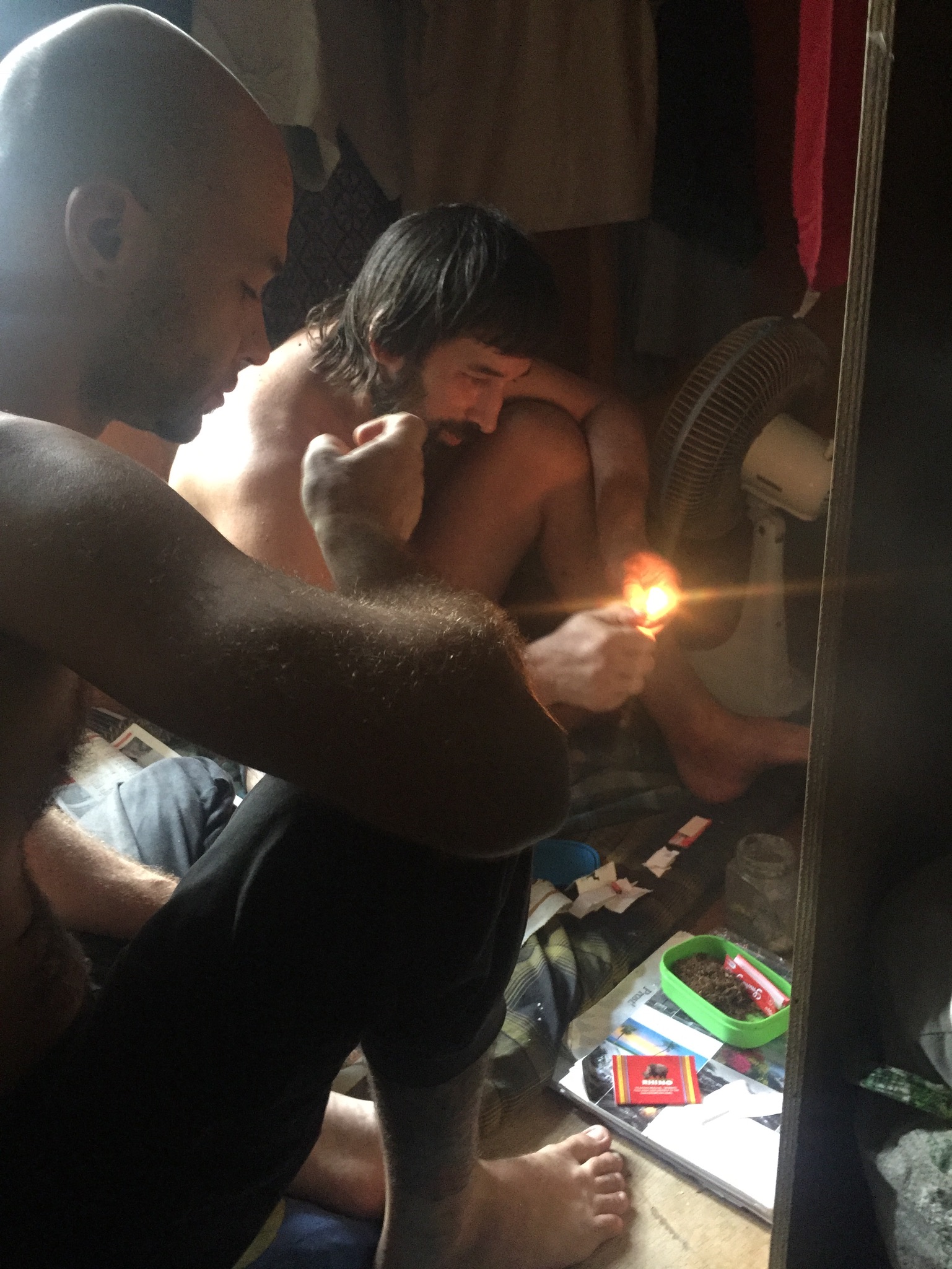The fate of two Russian drug traffickers caught just days apart in 2012 shows just what a lottery the Indonesian legal system can be.
Alexander Simonov, now 35, and Sergei Chernykh, 48, were initially thought to be part of a syndicate when arrested at Bali’s airport on April 24 and 26 respectively, both having flown from Kuala Lumpur.
But the pair only met for the first time in jail, and had obtained the hashish they smuggled from different sources.
Simonov, a yoga instructor and long-term Bali resident, was a frequent visitor to Nepal — ostensibly for meditation retreats, but actually to buy hashish which he sold for enormous profit on his return.
“I would buy one kilo for around $1,500 and sell it in Bali for at least $250 for 10 grams,” he said. “Not including what I kept for myself, I would make about $25,000 each time.”
Two or three “retreats” to Nepal each year, as well as money earned from yoga classes, gave him more than enough to live comfortably on the island.
“My yoga students were also my hash buyers,” he said. “It was a very good system. Nobody else was involved … no middleman or anyone else to pay.”
Chernykh was hitting Bali for the second time in a year, cashing in on the influx of Russian visitors that boosted tourism and the local property market before sanctions hit Moscow hard in 2013.
“Many Russians were going to Bali and they wanted to smoke hashish, but they had language problems and don’t want to risk buying from local people,” he said.
“I would see them in restaurants or bars or on the beach, and talk to them. You can tell who will be the ones who smoke hashish, so it was easy to sell to them. They trust me immediately.”
Neither consider themselves criminals in the legal sense of the word.
“We never stole anything. We only supply what people want. It is harmless,” said Simonov.
They were both “swallowers”, and caught in the wake of publicity surrounding the 2012 trial of Australian Edward Myatt, the first person caught in Bali smuggling drugs concealed in their body. He is currently serving nine years in Kerobokan.

Alexander Simonov
“The process to take all the hashish out of his stomach was quite long and difficult as he was not cooperative,” prosecutor Wijaya said at his trial, leaving much to the imagination.
Chernykh, meanwhile, had divided his 800 grams into 359 much smaller capsules and took seven days to excrete the entire load.
“I didn’t eat or drink. It just stuck there,” he said. “But the plastic was starting to make me sick. Eventually I had to give up.”
Neither has any idea why they were singled out as suspicious at the airport. They operated alone and off the radar of the drug gangs who regularly offered up a courier or rival to authorities in exchange for allowing the majority of their traffickers to get through.
Both were initially threatened with the death penalty — and the quantity they trafficked fell well within the threshold for the maximum sentence — but it was President Susilo Yudyohono’s last year in office and “SBY” had made no secret he was against capital punishment.
The absolute minimum either could hope for was a seven year sentence.
Simonov dug into his savings and a fighting fund started by his yoga pupils, customers and friends in Bali meant he spent around $100,000 on legal fees and “negotiations”.
Prosecutors recommended 11 years, but he was sentenced to eight and fined $100,000 or an extra three months.
Chernykh refused to game the system and didn’t pay a cent for his court-appointed lawyer or “negotiations”.

Sergei Chernykh
The trials were held just days apart, in the same courtroom, sharing two of three judges, yet had considerably different outcomes.
“I didn’t have the money to pay lawyers or bribes,” said Chernykh. “They told me for $150,000 I could have got a minimum of seven years, but I didn’t believe them. I thought they would cheat me.”
Simonov was furious with the outcome of his trial, throwing a tantrum on sentencing.
“Upon leaving the court, an emotional Simonov tried to hit a photographer before hurling an expletive and throwing his lit cigarette at the journalist,” the Bali Post said at the time.
“I was told I would get seven years,” he says today. “My lawyer guaranteed me seven years for what I paid him, but the bastards give me eight. What can I do?”
The pair are close friends in prison, but the only time they shared a cell they fought like cat and dog and had to be separated.
They had both embraced Buddhism long before their convictions, Eastern European latecomers to the hippy culture the West enjoyed decades before.
They both also fell into an abyss while in Kerobokan. For Simonov, crystal meth was his downfall; for Chernykh, heroin.
 “I only ever smoked hashish outside, cocaine if it was available and maybe some ecstasy,” says Simonov. “Actually I was clean-living.”
“I only ever smoked hashish outside, cocaine if it was available and maybe some ecstasy,” says Simonov. “Actually I was clean-living.”
But slowly his support network outside prison evaporated. Friends left the island, moved on or just stopped visiting. He hit the pipe.
“At one point, about two years ago, I was spending $200 a week on ice,” he said. “I only had about $100 a month to live on, so I was in debt.”
He was beaten up several times by dealers and eventually volunteered to go into the dreaded Cell Tikus (the punishment “rat cell”) in an effort to escape his creditors and clean up his act.
“I finally managed to pay off my debt. A friend outside gave me the money, but said he would never speak to me again. He still hasn’t, but I am grateful,” he said.
 He still smokes ice, but only as a treat once a month when an allowance from his mother arrives from Moscow. It’s not enough to live on, but he makes ends meet by preparing food and washing up for one of the block supper clubs.
He still smokes ice, but only as a treat once a month when an allowance from his mother arrives from Moscow. It’s not enough to live on, but he makes ends meet by preparing food and washing up for one of the block supper clubs.
Every month, he goes around the block scrounging for 20,000 rupiah ($2) where he can.
“I have no choice,” he says.
Chernykh hadn’t tried heroin when he first arrived in Kerobokan, but starting chasing the dragon and then injecting until he was a hard core addict.
“I love heroin,” he says. “It makes me forget where I am.”
He survived on $500 a month rent he got from an apartment he owns in Moscow, but spent that and more on heroin until November last year when he fell out of his bunk bed while under the influence, breaking his leg and opening a wound that became badly infected.
He effectively went cold turkey while under armed guard at Sangla hospital, where doctors feared they may have to amputate his leg, and on his return to jail vowed to quit heroin.
Although he stopped injecting, he smoked until last month, when he joined the prison methadone program. He also takes about 10 Xanax a day, which leaves him incoherent for much of the time.
In his lucid moments, he talks about the years he is wasting.
“I really regret what happened,” he says, “but the clock cannot go backwards.”

Great post, David. Good and gritty. I’m addicted!
Good stuff
How was the Braai brother ?
I look forward to reading your posts Foxy… keep up the good work… less than 50 sleeps to go 🙂